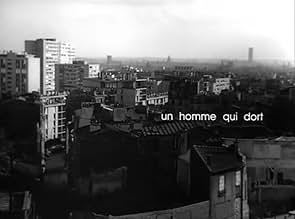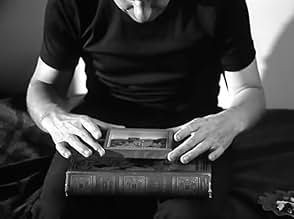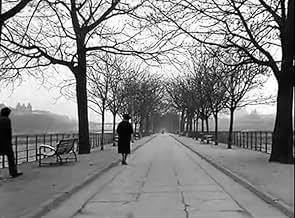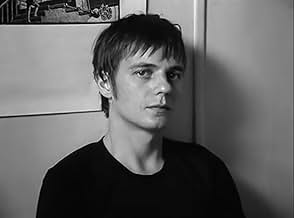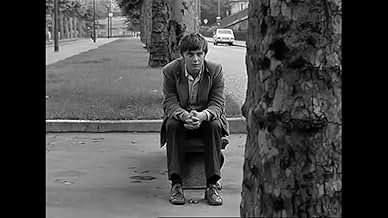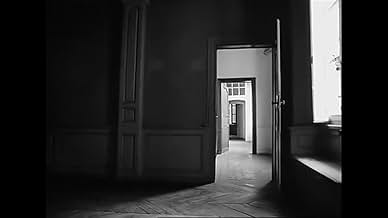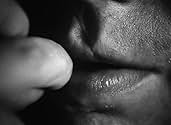Un homme qui dort
- 1974
- Tous publics
- 1h 17min
NOTE IMDb
7,9/10
5,2 k
MA NOTE
Ajouter une intrigue dans votre langueA 25-year-old male student in Paris becomes indifferent to the world around him, and subsequently feels a strong sense of alienation and hopelessness.A 25-year-old male student in Paris becomes indifferent to the world around him, and subsequently feels a strong sense of alienation and hopelessness.A 25-year-old male student in Paris becomes indifferent to the world around him, and subsequently feels a strong sense of alienation and hopelessness.
- Réalisation
- Scénario
- Casting principal
- Récompenses
- 1 victoire au total
Avis à la une
Un Homme Qui Dort is a mesmerizing existentialist trip across different states of mind, with an unusual narrative: only a voice-over speaking out the realizations of the ever-silent, intriguing main character, a student in Paris, who wakes up one day to realize the meaningless of life, and starts discovering the liberation of indifference.
Un Homme Qui Dort is one of the most original, thought-provoking films I've seen in a long time. It effectively portrays an existential crisis, solitude, depression and anxiety, but also peace of mind, using hypnotic, poetic images of 1970s Paris, shot in atmospheric black and white, and accompanied by a haunting soundtrack.
A hidden gem.
Un Homme Qui Dort is one of the most original, thought-provoking films I've seen in a long time. It effectively portrays an existential crisis, solitude, depression and anxiety, but also peace of mind, using hypnotic, poetic images of 1970s Paris, shot in atmospheric black and white, and accompanied by a haunting soundtrack.
A hidden gem.
Here, a truly great fusion of french cinema and existential meditation. Surely a modern classic ? A tonic for any modern young adult in the throws of angst or severe doubt and questioning about the world. A rite of passage i have observed in many a friend in my own life.
French cinema is in the habit of not letting you down. It thankfully goes all the way when it comes to philosophical comment. It's discourses articulating the feelings you long to, no need, must hear from the world.
Somewhere in the vaults there it sits underplayed. Play this film. So modest, so slight, so grave. The uplifting chant of a culture that knows how to speak. Perec the writer and director, a national treasure for a good reason.
French cinema is in the habit of not letting you down. It thankfully goes all the way when it comes to philosophical comment. It's discourses articulating the feelings you long to, no need, must hear from the world.
Somewhere in the vaults there it sits underplayed. Play this film. So modest, so slight, so grave. The uplifting chant of a culture that knows how to speak. Perec the writer and director, a national treasure for a good reason.
Perhaps cinema's final word on loneliness, aimlessness, and withdrawal, strikingly filmed in black and white. You may love it or hate it, but you probably have never seen anything like it (or Paris like this) before. *** out of 4.
Just watched my whole life. Emptiness of the existence, the pain of existential crisis and the most painful things living, will and idea as Schopenhauer said. "Living painless" is the most painful thing, ironic, but this is the truth.
Ah, my own incapable existence... You are becoming numb when you don't think about the mean of existence and when you don't feel the pain of BEING. HUMAN BEING.
You want to be as usual but you can't, something's gonna stop you, you don't want to read books, you don't want to think, you're just gonna walk without thinking about anything.
Ah, my own incapable existence... You are becoming numb when you don't think about the mean of existence and when you don't feel the pain of BEING. HUMAN BEING.
You want to be as usual but you can't, something's gonna stop you, you don't want to read books, you don't want to think, you're just gonna walk without thinking about anything.
This criminally underrated 1974 film easily ranks among the likes of "Pickpocket", "Breathless" and "The 400 Blows" as among the greatest films in french cinema. This film chronicles a young man who has dropped from his studies and is trying to distance himself from the world around, but starts finding it increasingly hard.
Shot in black and white, the film feels like a new wave film with it's raw, low budget cinematography, having a grainy and gritty look that punctuates the intense, somber mood of the film. Scenes in darkened areas are reminiscent of noir films in their use of shadow, and the editing is generally quick, sometimes with a musical flow. In addition to the imagery, the story is conveyed through a second person female narrator (second person meaning the narrator is always referring to "you", such as "you do or don't get up"). Interestingly, whenever the situation becomes more anxious and desperate, the narrator's normally flat tone starts to become more panicked, or angry. So while the film may seem initially as just a woman talking about something this man is doing, in reality it does have a, albeit abstract, character arc.
Although at times trying on the patience, this film's style ultimately pays off, creating a completely unique and engrossing experience. The slow, subtle deteoration of the main character's mental state spills into your mind. I was rarely bored while watching, thanks to the powerful imagery and raw, minimalist atmosphere. The detachment our lead is trying to create is perfectly conveyed. The film recreates the tedium and a sort of numb pain, the depravity, desperation and entrapment this attempted lifestyle leads to.
If you want a more traditional narrative, certainly look elsewhere. If what you've read here and in other reviews sounds interesting, than this is probably the film for you.
Shot in black and white, the film feels like a new wave film with it's raw, low budget cinematography, having a grainy and gritty look that punctuates the intense, somber mood of the film. Scenes in darkened areas are reminiscent of noir films in their use of shadow, and the editing is generally quick, sometimes with a musical flow. In addition to the imagery, the story is conveyed through a second person female narrator (second person meaning the narrator is always referring to "you", such as "you do or don't get up"). Interestingly, whenever the situation becomes more anxious and desperate, the narrator's normally flat tone starts to become more panicked, or angry. So while the film may seem initially as just a woman talking about something this man is doing, in reality it does have a, albeit abstract, character arc.
Although at times trying on the patience, this film's style ultimately pays off, creating a completely unique and engrossing experience. The slow, subtle deteoration of the main character's mental state spills into your mind. I was rarely bored while watching, thanks to the powerful imagery and raw, minimalist atmosphere. The detachment our lead is trying to create is perfectly conveyed. The film recreates the tedium and a sort of numb pain, the depravity, desperation and entrapment this attempted lifestyle leads to.
If you want a more traditional narrative, certainly look elsewhere. If what you've read here and in other reviews sounds interesting, than this is probably the film for you.
Le saviez-vous
- AnecdotesThe film has several paintings by René Magritte: "La reproduction interdite" (1937), over Man's bed is the most prominent. The surreal cinematography also references "Pilgrim" (1966) and possibly other works of his as well. Also featured over the bed is "Relativity" by M.C. Escher.
Meilleurs choix
Connectez-vous pour évaluer et suivre la liste de favoris afin de recevoir des recommandations personnalisées
- How long is The Man Who Sleeps?Alimenté par Alexa
Détails
- Durée1 heure 17 minutes
- Couleur
- Mixage
- Rapport de forme
- 1.37 : 1
Contribuer à cette page
Suggérer une modification ou ajouter du contenu manquant

Lacune principale
By what name was Un homme qui dort (1974) officially released in India in English?
Répondre
